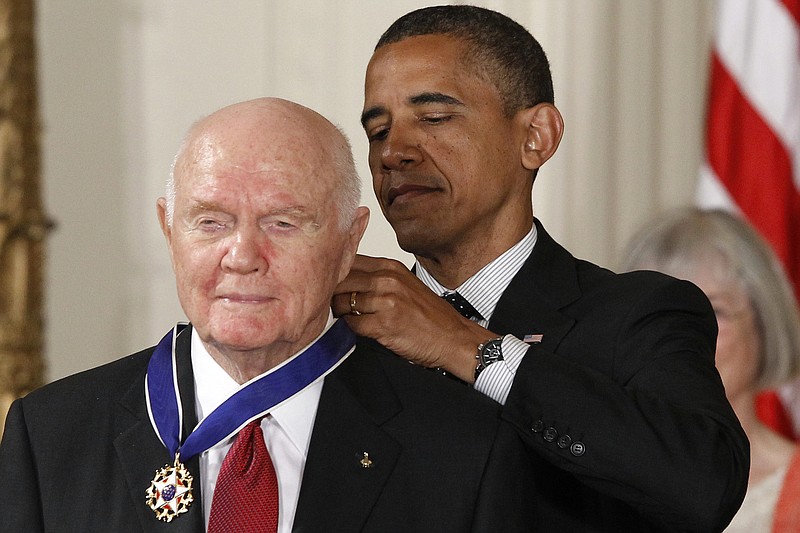For many baby boomers, John Glenn was as close to an authentic American hero as anyone could get. It was largely due to his feat of being the first American to orbit the Earth that if you asked most elementary school-aged children in the mid-1960s what they wanted to be when they grew up, "astronaut" would have been the most popular answer.
It was a different era.
Glenn, who died Thursday at the age of 95, represented a time when the United States still seemed ascendant, able to do anything. Stung by the 1957 launch by the then-Soviet Union of Sputnik, the first artificial satellite, and the 1961 first human spaceflight by the Soviet Union's Yuri Gagarin, the country vowed to win the space race to the moon - and did.
The Ohio native was the last of the "Mercury Seven," the group of military test pilots selected in 1959 by NASA to become the nation's first astronauts and later immortalized in the Tom Wolfe book "The Right Stuff" (which became a movie of the same name). And as he was nearly 40 when he was selected and didn't have a degree in science (which his alma mater, Muskingum College, awarded him after his flight around the Earth), he barely made the cutoff.
But perhaps because of the ticker-tape parade given him after his Friendship 7 flight that took him around the globe three times in 1962 and a succeeding address to a joint session of Congress, Glenn became the best known of the early astronauts.
Yet, despite what our minds may tell us about his many feats in space, he never made another flight during the run-up to the Apollo missions that first made a moon landing in 1969. Indeed, he told a Columbus, Ohio, audience in 2007 that he learned years after he left the space program that then-President John F. Kennedy secretly had barred him from more flights, afraid the country might lose a national hero were a space tragedy to occur.
But Glenn did get back to space, an effort for which he relentlessly lobbied and one that endeared him to generations born after the heady 1960s. In 1998, at the age of 77, he orbited the Earth with six astronauts aboard the shuttle Discovery, bookending his early contributions to science through the NASA program with this latter one that gave researchers an idea how the oldest man in space might fare. The hearty Glenn not only survived but thrived.
"Old folks have ambitions and dreams too, like everyone else," he said. "Why don't they go for them? Don't sit on a couch someplace."
In between his first and second flights around the Earth, he served four terms in the United States Senate. A Democrat who left office as recently as 1999, his brand of politics now seems so distant from the party dominated today by the far left Barack Obama-Hillary Clinton wing of the party.
"I never heard him say a bad thing about anyone," longtime friend Jack Kessler told the Columbus Dispatch. "Some of his best friends were Republicans, and he could work with anyone."
In 1984, Glenn was thought to be the main rival of former Vice President Walter Mondale for the Democratic presidential nomination. However, he finished a distant third in New Hampshire behind upstart Sen. Gary Hart and Mondale, and dropped out of the race two weeks later.
Jim Hall, a Signal Mountain resident who was the former National Transportation Safety Board chairman under President Bill Clinton, ran the Ohioan's short-lived campaign in the South and said he "couldn't be prouder I got the opportunity to know and be associated with him."
By the time the campaign reached the South, he said, due to the "political miscalculations of others," Glenn's campaign had spent all its time and money to compete for the "very liberal" Democratic vote in the Iowa caucus. As such, it "never got off the ground."
Nevertheless, with Glenn, "what you saw is what you got," said Hall, who later was invited by Glenn to see the launch of the 1998 flight. "Without a doubt, he was every bit a gentleman, a kind person, an aviator. He loved science and talking about science and talking about the possibility of the future as it related to aviation and space. He was always respectful, always attentive, never trying to be flamboyant, or what he wasn't."
A pity. How much more inviting would those characteristics have been on our presidential candidates than what we endured from both the Democratic and Republican nominees in 2016.
Beyond his career as an astronaut and his nearly quarter century in the Senate, though, was Glenn's measure as a man. He married his childhood playmate, Annie Castor, and was supportive of her as she dealt with - for more than her first 50 years - a severe stuttering disability that made communication extremely difficult.
While she was made fun of for the inability to do simple things such as talking on the phone and speaking with friends, Glenn, she said in a 2010 video interview, "would just wait patiently until I finished trying to get the words out." Their nearly 75-year marriage, friends said, was one of mutual respect and was a true partnership.
That, in addition to everything else we remember about this American hero, was also the right stuff.
